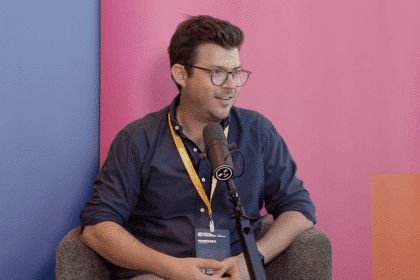Google is testing a new experimental AI feature, Daily Listen, which would transform users’ Search and Discover feed activity into a personalised podcast experience. The feature, currently in beta testing within Google’s Search Labs, would create roughly five-minute audio summaries of news articles and topics based on a user’s search history and Discover feed interactions.
The Daily Listen feature, available to select Android and iOS users in the U.S., provides a short audio overview of trending stories and includes an accompanying transcript for those who prefer to read.
Search Labs users can control playback with standard audio scrubber tools like play, pause, rewind, and skip functions. The Daily Listen will be available in the personalised widget carousel underneath the search bar at the top of the google app, while a “related stories” tab will also be available to lets users explore similar content. Feedback tools such as thumbs-up or down options aim to fine-tune personalisation further.
Google is yet to confirm when this tool will be rolled out more broadly.
Publishers VS AI Debate Reactivated
While on the surface, this kind of tool can significantly benefit users; there is no denying the potential implications it could have for media publishers – undoubtedly opening up the great AI debate in the publishing industry once again.
By transforming users’ Search and Discover feed data into personalised audio summaries, the feature could help publishers reach broader audiences, particularly those who prefer audio content or passive consumption while multitasking. As short-form audio continues to grow in popularity, media brands may find this AI-driven feature a new avenue for audience engagement, potentially driving traffic back to original articles if Google ensures proper credit and links within the experience.
However, there is a considerable risk that these audio summaries could reduce direct engagement with original content. If users feel they are getting the essence of a story from the AI-generated podcast alone, they may skip visiting the source, limiting the page views publishers rely on for ad revenue.
AI’s threat to publishers is far from a new conversation. Back in May 2024, News Corp signed a major content-licensing pact with OpenAI that would allow OpenAI to use content from News Corp’s extensive range of news publications, including archives, to answer users’ queries and train its technology.
In short, this would allow Google AI to answer questions that were once answered by news articles, removing the need for users to enter publisher websites.
At the time, Dr Rob Nicholls, senior research associate at the University of Sydney School of Media and Communications, said there is a risk that the partnership will see News Corp content aggregated by OpenAI and ultimately reduce advertising revenue, despite recognising that the extent of this is currently unknown.
“It is likely that there will be a delay between any story being published by News and it being available to OpenAI. That is, News Corp has almost certainly provided access to the archive rather than the news. The delay between the two may only be a matter of a few days”.
Kellyn Coetzee, national head of AI and insights at Kinesso, told B&T, however, that the deal presented a huge opportunity for publications that are “barely sustained by the current ad model”. “With major AI companies buying up large publications, Bezos, these AI giants may inadvertently save journalism, albeit at the social cost of owning the narrative”.
While Daily Listen represents an evolution in how audiences engage with news, it also highlights the ongoing challenges media outlets face in balancing visibility with content control in an AI-dominated digital landscape.








